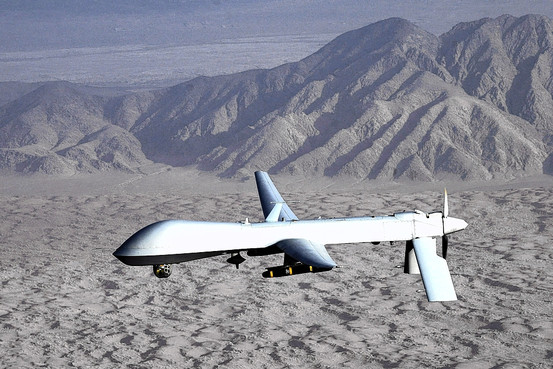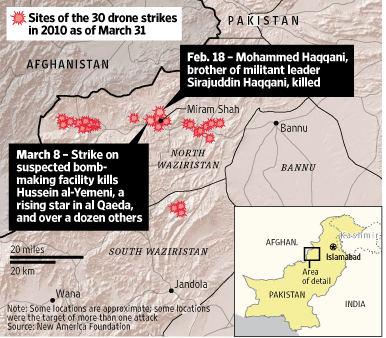April 5, 2010
U.S. Defends Legality of Killing With Drones
By KEITH JOHNSON WASHINGTON--The Obama administration, facing questions about the legality of its drone program--a key part of U.S. counterterrorism efforts in Pakistan's Afghan-border region--is pushing back with a legal defense of a program it only tacitly acknowledges. The United Nations Special Rapporteur for Extrajudicial Executions and some legal scholars have questioned whether it is legal for the U.S. to target and execute individuals in countries the U.S. isn't at war with. Professor Mary Ellen O'Connell of the University of Notre Dame law school has called the drone program "unlawful killing," and says it violates international law. For the first time, a senior Obama administration official--Harold Koh, the State Department's legal adviser--has publicly articulated the legal basis for targeted killings. "In this ongoing armed conflict, the United States has the authority under international law, and the responsibility to its citizens, to use force, including lethal force, to defend itself, including by targeting persons such as high-level al Qaeda leaders who are planning attacks," Mr. Koh told an audience of international legal scholars on March 25. The Central Intelligence Agency has used drones to kill between 400 and 500 suspected militants since January 2009, senior intelligence officials say. The entire program has been expanded notably since Mr. Obama took office. While critics of the program cite collateral civilian deaths, intelligence officials say only about 20 civilians have been killed in that period--a lower estimate than that made by some independent researchers. National security hawks in the legal community as well as among former Obama and Bush administration officials say they worry the legal scrum could limit the government's ability to track down and kill suspects. The arguments against the program echo the legal challenges that helped overturn U.S. policies on the treatment of terrorism detainees. Mr. Koh's defense in March won agreement from national security experts such as Ken Anderson, of the Washington College of Law at American University in Washington, who has urged the administration to make a legal case to safeguard what has become an important part of the antiterrorism arsenal. Mr. Koh's speech was also noteworthy because, before joining the State Department, Mr. Koh, a human-rights lawyer, was an outspoken critic of most of the George W. Bush administration's policies regarding the war on terrorism.Legal criticism of the drone program has continued, however. "A number of controversial questions were left unanswered" by Mr. Koh's speech, says Jonathan Manes, a lawyer on the American Civil Liberties Union's National Security Project. "The speech did not say where the government draws the line between legitimate targets--combatants and those taking part in hostitilities--and civilians, who cannot be targeted. The speech also did not set out any rules on where drones strikes can be used to target and kill individuals," Mr. Manes says. The ACLU filed a Freedom of Information suit last month in a bid to force the government to divulge details of the classified program. Brett McGurk, a former National Security Council official in the Bush and Obama administrations currently at the Council on Foreign Relations, says Mr. Koh sidestepped some of the "thorniest issues" surrounding targeted killing. Mr. McGurk specifically noted questions about "the implications of civilian agencies--the CIA--controlling the kill chain." The drone program falls into a legal grey area. International Humanitarian Law regulates continuous armed conflict between states, with recognizable combatants--little of which prevails in the U.S. fight against al Qaeda and its allies. As a civilian agency and a noncombatant under International Humanitarian Law, the CIA isn't governed by the same laws of war that cover U.S. military personnel. The CIA says the program is legal. "Without confirming any specific activity, CIA's counterterrorism operations are lawful and precise," said CIA spokeswoman Marie Harf. A concern voiced by legal scholars and former and current administration officials is that without an articulated legal basis for the attacks, U.S. officials could in the future be targeted themselves--by crusading judges in other countries who see targeted killings as violations of humanitarian law. Another potential pitfall: The Obama administration relies on a Bush-era congressional resolution as its main authority to track and kill suspected al Qaeda members. That 2001 resolution authorized the president to "use all necessary and appropriate force against those nations, organizations, or persons" deemed linked to the September 11, 2001 attacks--a justification that dims as time passes. Relying on that authorization has its limits, warns Mr. Anderson, the American University professor as the fight widens to include individuals who aren't necessarily part of al Qaeda or armed fighters. That roster could include Anwar al Awlaki, a U.S.-born Muslim cleric believed to be hiding in Yemen, where the U.S. has aided counterterrorism efforts. "One of these days, a future president will face new threats that don't have anything to do" with al Qaeda or the Taliban--and the 2001 congressional authorization won't serve as a legal basis for targeting those threats, Mr. Anderson says. --Siobhan Gorman contributed to this article.

European Pressphoto Agency
An armed MQ-1 Predator drone, in an Air Force handout photograph
